Democrats take first steps of 50-state strategy
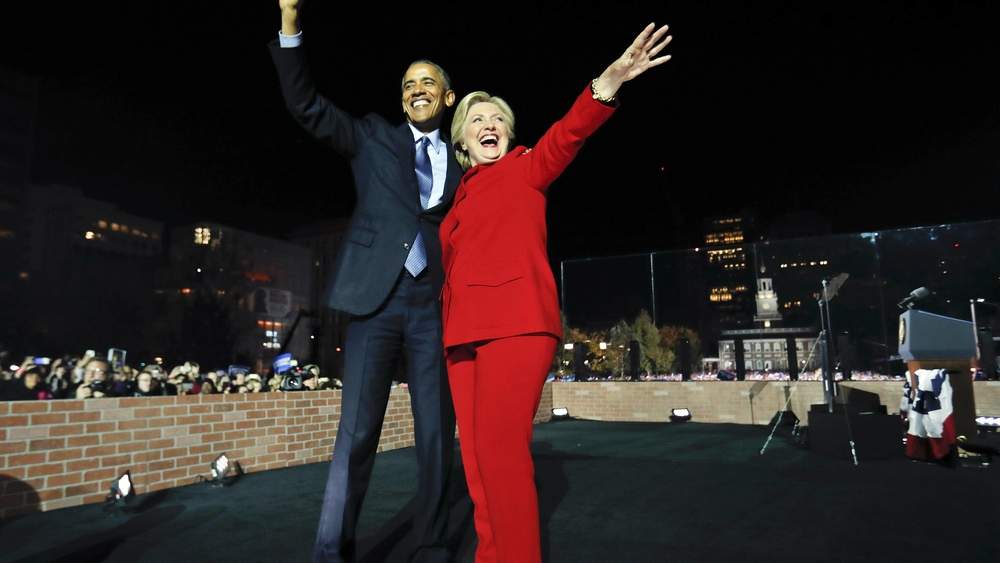
National Democrats are taking the first, modest steps toward their promised 50-state strategy, lending help to state and local parties as they try to harness opposition to President Donald Trump and the Republican monopoly in Washington. Dubbing the effort “Resistance Summer,” the Democratic National Committee plans to distribute about $1 million – with promises of more later – through a matching grant program for local Democrats to organize voters. It’s the party’s first concrete expansion plan since Tom Perez took over as chairman, and party leaders bill it as a recognition they must do more to get actual votes out of the anti-Trump groundswell. The amount is a fraction of the billions spent nationwide each election cycle and shows what the party is up against alongside liberal grassroots organizations and even a new political organization, Onward Together, by 2016 Democratic presidential nominee Hillary Clinton. Minnesota Rep. Keith Ellison, Perez’s opponent for chair and now his top deputy, said the intent is to help local Democrats manage everything from rallies, town halls and neighborhood meetings to registration drives and voter database improvements. “We’re asking them to engage neighbors not just in this whole mess about Trump … but on what kind of vision we have for our country,” Ellison said, adding that he and Perez are talking regularly to many of the independent groups on the left. Initial recipients include Arizona, Massachusetts, Michigan, Kansas and South Dakota. Those states span the spectrum of Democratic fortunes: Massachusetts is a liberal bastion; Michigan is a presidential battleground; Arizona is nearing swing-state status; Kansas and South Dakota are Republican strongholds. Nationally, Democrats face a power deficit they’ve not seen in nine decades. Republicans control the White House and Congress, hold 33 governorships and run about two-thirds of state legislatures. Michigan Democratic Chairman Brandon Dillon said he’d use the national money to help pay the six new field organizers he’s hired since November, when Clinton lost to Trump by fewer than 11,000 out of more than 4.5 million votes. Those workers are updating individual voter information the party gives its candidates. “Our voter file isn’t as good as it should be, and we haven’t been doing the kind of organizing we should,” Dillon said. In Republican-run Kansas, Chairman John Gibson has only one organizer based outside the capital. His goal is hiring one for each of the state’s four congressional districts, including a Wichita-based district where Democrats just lost a surprisingly close special House election. “It’s up to Democratic candidates to make that argument” for “a better way of governing,” Gibson said, “but it’s the job of the party to build the infrastructure candidates can use to win campaigns.” Republished with permission of The Associated Press.
Donald Trump adviser: Secret warrant may have caught hacker contact
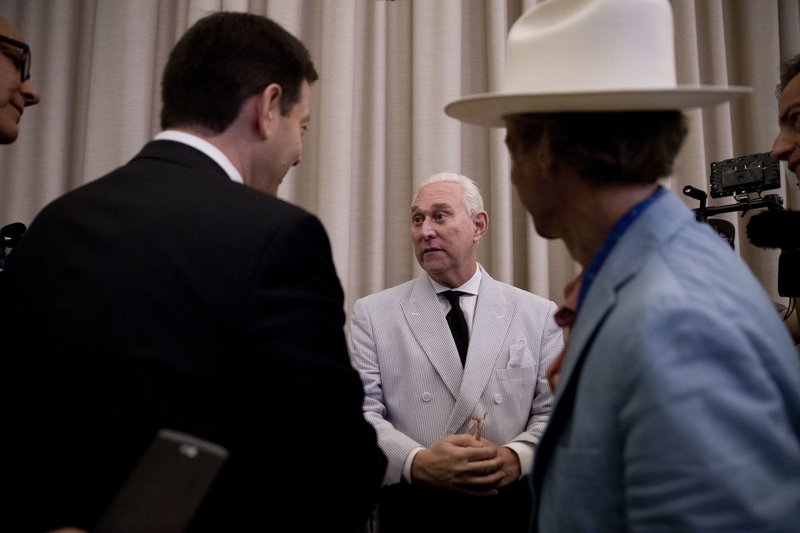
Longtime Trump adviser Roger Stone says he believes his contacts with a Russian-linked hacker who took credit for breaching the Democratic National Committee may have been obtained through a FISA warrant, which allows the government to collect the communications of individuals suspected of being agents of a foreign power. Stone is among a handful of President Donald Trump‘s associates who are under scrutiny for possible links to Russia during the presidential race. In a statement to The Associated Press, Stone said he’s retained two attorneys to explore whether he can compel the government to “either charge me or admit they have no case whatsoever.” The Republican operative has acknowledged having a Twitter exchange with Guccifer 2.0, a hacker that U.S. officials believe has ties to Russia. Stone said he was “unaware at the time of the brief exchange of allegations that the hacker in question is suspected of being a Russian asset.” “I have no relationship with the Russian state, Russian Intelligence or any other Russians,” said Stone, who split with Trump’s campaign in August 2015 but remains in touch with the president. Stone’s messages with Guccifer 2.0 were first reported by the website The Smoking Gun. He said the story contains information that “could only be learned by surveillance of my domain and eavesdropping on my e-mail, phone calls and texts.” “If these where obtained through a FISA warrant as I believe and the information was leaked to the Smoking Gun, that would constitute a felony,” Stone said. He also suggested, without evidence, the government had Trump under surveillance during the presidential campaign. Trump has accused former President Barack Obama of wiretapping the New York skyscraper where he lived and ran his campaign, though he has provided no evidence to support his explosive allegation. On Monday, the White House started softening Trump’s claims, with spokesman Sean Spicer saying the president was referring to general surveillance that may have been approved by the Obama administration. The FBI, as well as House and Senate committees, are investigating Russia’s interference in the 2016 election and possible contacts between Trump associates and Russians. Trump has asked the congressional committees also to investigate his wiretapping allegations, though the Justice Department missed a Monday deadline to provide evidence to the House committee. Sen. Lindsey Graham, R-S.C., says he’s waiting to hear from FBI Director James Comey whether a warrant was issued that would have allowed the Obama administration to tap Trump’s phones during the campaign. Graham says he asked Comey to answer by Wednesday and also to say whether the FBI is investigating Russian interference in the 2016 campaign. If Comey doesn’t comply, Graham says Congress “is going to flex its muscle.” “We’ll issue a subpoena to get the information, we’ll hold up the deputy attorney general’s nomination until Congress is provided with the information to finally clear the air as to whether there was ever a warrant issued against the Trump campaign,” Graham, who heads the Judiciary Committee’s crime and terrorism subcommittee, said Wednesday on NBC’s “Today” show. Republican Sen. John McCain has singled out Stone as a Trump associate who should answer questions about his ties to Russia. The Arizona lawmaker suggested in an interview Sunday with CNN that Stone may have ties to ousted Ukrainian President Viktor Yanukovych. Stone denied any connection to Yanukovych or his political party. Stone said he did work for a “small pro-Western splinter party” of Ukrainian politician Volydmyr Litwin, calling the effort to help win seats in parliament a “low budget operation.” Stone said he is willing to testify in any Senate hearings that occur “in public and not behind closed doors.” He’s retained former U.S. Attorney Kendall Coffey and South Florida lawyer Grant Smith to represent him. Last year, Coffey represented Trump campaign manager Corey Lewandowski when he was charged with simple battery after an altercation with a female reporter. The prosecutor later dropped the charges. Republished with permission of The Associated Press.
Out of power, state Dems frustrated with national committee
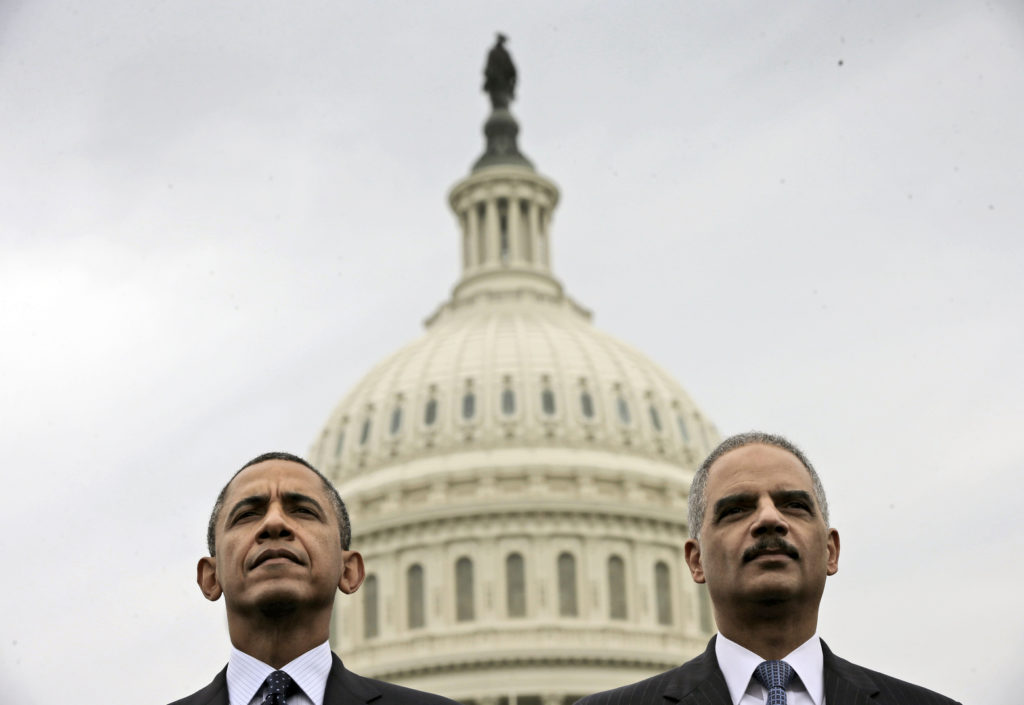
Democrats around the country are demanding change from a national committee they say has focused too heavily on the White House at the expense of governorships, legislatures and state party operations. “It’s got to be helping us organize in our states to be able to build that power at the state legislative level,” Michigan Democratic Party Chair Brandon Dillon said of the Democratic National Committee, currently searching for a new leader. “We’ve lost governorships and state legislatures at a rate that is pretty astounding.” DNC members gather in February to elect a new chairman, with five candidates running so far, each pledging to rebuild from the ground up. Money from the DNC to state parties has been inconsistent during President Barack Obama’s tenure and, in most states, less than it was under former chairman Howard Dean. Party chairs say that’s resulted in fewer staff members and training programs, a change felt particularly in Republican-leaning states. State leaders also say Obama’s grassroots group Organizing for Action has functioned more like competition than a partner. Beginning in 2017, Republicans will hold 33 governorships and fully control legislatures in 25 states, as well as the Congress and presidency. During Obama’s two terms in office, the party lost more than 1,000 seats at the state and national level. “I love President Obama, but he and his administration allowed for the deterioration, the terrible deterioration, of the state parties over the last eight years,” said Mark Brewer, who led the Michigan Democratic Party for 18 years. Obama has announced plans, though, to improve Democrats’ down-ballot fortunes once he leaves office. He is launching an initiative with former Attorney General Eric Holder aimed at making Democratic gains when states redraw legislative district lines following the 2020 census. Democrats have blamed Republican gerrymandering for some of their losses in Congress and state legislatures. State officials say it’s been hard to plan long term and recruit and train candidates in off-election years due to inconsistent funding from the DNC. Under Dean, the national party installed and paid several staff members in each state. But that program ended after Obama’s election. State parties began to receive monthly payments of anywhere from $5,000 to $10,000, an amount that varies depending on the year. At some point, the parties have received no money at all. The DNC does provide some money to state parties for elections based on the state’s competitive races and other factors. The change has left some states scrambling. The Nebraska Democratic Party, for example, paid five full-time staff members during Dean’s tenure. But when Dean’s “50-state strategy” ended, it was hard to keep one and pay the rent, said Maureen Monahan, a vice president of the Association for State Democratic Chairs from Nebraska. Some states, such Mississippi, do not pay their party chairs. Even in Michigan, a staff that once stood at more than a dozen now is between five and seven employees, party chairs said. “The past eight years we have not had any focus on the state parties,” Monahan said. “There’s been a sense that the DNC is a building in Washington.” The push-and-pull between state parties and the DNC is nothing new. State parties, congressional Democratic groups and the president’s allies often spar over how best to spend party resources. The DNC defended its involvement with states. “State parties are the lifeblood of the DNC, and we make investing in all of them a priority because they are an integral part of winning up and down the ballot. State parties were critical to picking up Senate seats, House seats, legislative chambers and governorships in 2016, and their importance will be a key focus for the party as we elect new officers in February,” DNC spokesman Adam Hodge said. Marcel Groen, Pennsylvania Democrats’ chair, said it’s unfair to blame Democrats’ troubles completely on the national party. But he said a focus on recruiting and running Democrats even in low level races in Republicans areas can help the top of the ticket in the long term. “We can’t expect people in rural areas, in red areas, to vote for our presidential candidates or our gubernatorial or Senate candidates if they’ve never seen a Democrat running for school board or county office,” he said. Republished with permission of The Associated Press.
Joe Biden ‘not interested’ in running for Democratic Party chair
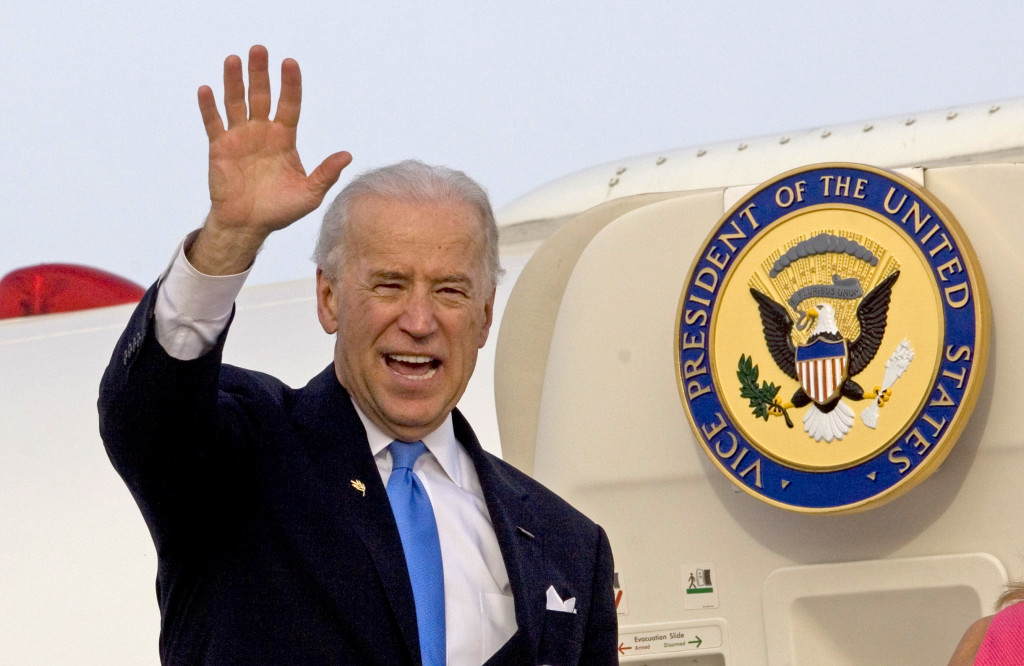
Vice President Joe Biden closed the door Tuesday on the possibility of leading the Democratic Party after leaving the White House next year. Biden’s name has been floated in recent days among Democratic insiders looking for someone with the stature and position to lead the party out its electoral abyss. Democrats urging him this year to run for the Democratic National Committee chairmanship had said his appeal to white, working-class voters might help the party refocus after losing badly among those voters to President-elect Donald Trump. “The vice president is not interested in being DNC chair, but he intends to remain deeply involved in helping shape the direction of the Democratic Party moving forward,” his spokeswoman, Kate Bedingfield, said. Largely leaderless other than outgoing President Barack Obama, the Democratic Party early next year will choose a new national chairman following devastating losses in the 2016 elections. Longtime Chairwoman Debbie Wasserman Schultz stepped down under pressure during the Democratic National Committee. Since then, interim Chairwoman Donna Brazile has led the party, also under pressure after stolen emails showed she’d communicated with Hillary Clinton‘s aides about potential questions to be asked in campaign forums. “Joe Biden is the one person who I think could bring the party together, the progressive wing of the party, the left and center, and start giving a cogent message to those working-class Democrats who abandoned us,” former DNC Chairman Ed Rendell told CNBC earlier Tuesday. Bowing out of the DNC race means Biden will likely cease to have a formal role in the party come January after serving more than four decades in elected office. He’s expected to remain a public voice and has discussed with universities the possibility of setting up a policy center or institute. He’s also said he’ll continue to work on the “moonshot” he launched after his son died to accelerate cancer research. Biden faced even louder calls last year to run for president, but ultimately declined. Republished with permission of the Associated Press.
Ex-Maryland Gov. Martin O’Malley says he won’t seek to lead DNC
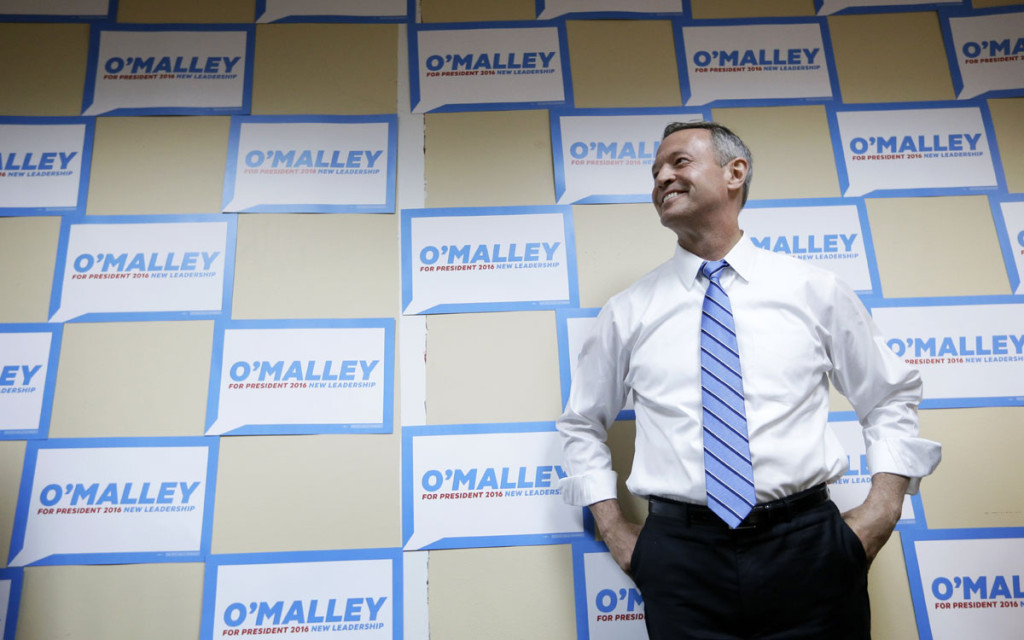
Former Maryland Gov. Martin O’Malley says he won’t seek to become chairman of the Democratic National Committee. O’Malley released a statement Wednesday saying he’s grateful to friends who urged him to consider running, but he won’t seek the chairmanship. He says the committee needs a chairman “who can do the job fully and with total impartiality.” The announcement comes days after O’Malley said he was “taking a hard look” at the position after being approached by “many Democrats who believe our party needs new leadership.” O’Malley ran for president, but he ended his campaign in early February midway through vote-counting in the Iowa caucuses after his bid failed to gain traction against Hillary Clinton and Bernie Sanders. He is a former two-term governor and Baltimore mayor. Republished with permission of the Associated Press.
Still reeling, Democrats begin battling for future
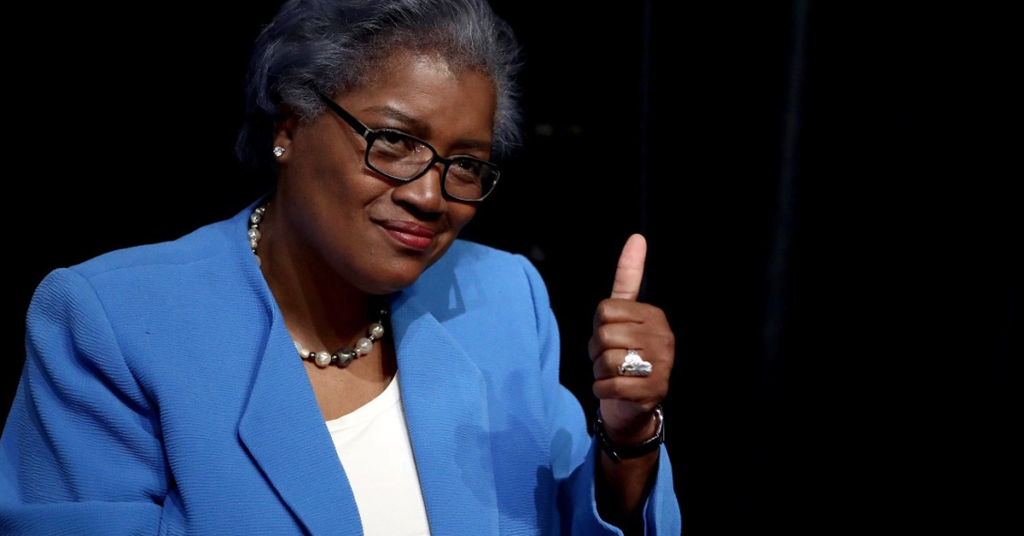
Still reeling from a devastating defeat in last week’s election, Democrats are beginning the process of charting the direction of their party in the Donald Trump era. With Hillary Clinton and her team staying out of the public eye, liberal politicians have begun jockeying for control of the party’s future. While they all backed Clinton, they’re now pushing for a serious shift in the party’s policy positions, financial resources and grassroots organizing to focus more on motivating their base and winning back the white working class voters who went for Trump. “We have to do a lot of rethinking,” said Vermont Sen. Bernie Sanders, who mounted a fierce challenge to Clinton in the primary. “Democrats are focused too much with a liberal elite, which is raising incredible sums of money from wealthy people,” Sanders said on CBS’s “Face the Nation.” The Democratic National Committee, the last bastion of party power in Washington, is quickly emerging as ground zero for the fight. After losing the White House and Congress – and likely the ideological tilt of the Supreme Court – the Democrats’ new chief likely will be one of the party’s most visible faces in politics, making the role a far more influential post than it was during the Obama administration. Already, around a dozen Democrats’ names have been publicly floated to succeed interim chairwoman Donna Brazile, who replaced Florida Rep. Debbie Wasserman Schultz in July after she was caught up in a hacking scandal. Minnesota Rep. Keith Ellison, a prominent progressive and the first Muslim elected to Congress, has emerged as an early contender, backed by much of the party’s liberal wing. He’s also picked up support from several key Democratic leaders, including outgoing Senate Democratic leader Harry Reid and Reid’s likely replacement, New York Sen. Chuck Schumer. Ellison was expected to officially announce his bid on Monday. His supporters argue that Ellison’s faith would send an important signal about the party’s commitment to inclusivity during the Trump administration. “My friend Keith Ellison is a terrific leader and a strong progressive who knows how to get things done. Now is the time for new thinking and a fresh start at the DNC. Now is the time for Keith,” Reid said in a statement on Sunday. In interviews on Sunday talk shows, Ellison pushed back on concerns that he’d be unable to balance party responsibilities with the politics of his day job in Congress – a problem some Democrats believe hampered Wasserman Schultz. “There’re a lot of places that I can serve,” he said, in an interview on NBC’s “Meet the Press.” ”I’m looking for a place to be of use and benefit. And every single Democrat in this country better be thinking the exact same way.” Ellison is far from the only contender for the job. Former Vermont Gov. Howard Dean announced his intention Thursday to reclaim a post he held during the Bush administration. Former Maryland governor Martin O’Malley, DNC National Finance Chairman Henry Muñoz III, and South Carolina Democratic Party Chairman Jaime Harrison have also said they’re considering bids. Others are pushing for a Latino leader, arguing that the growing demographic group is crucial to the party’s future and should be represented at the highest levels of its leadership. Outgoing Labor Secretary Thomas Perez, Arizona Rep. Ruben Gallego and California Rep. Xavier Becerra are said to be weighing a bid. Jason Kander, an Army veteran who lost the Senate race in Missouri to Roy Blunt on Tuesday, is also said to be considering a run. The contest comes at a time of deep unrest for the party – and the country. Anti-Trump protests continued this weekend with thousands of demonstrators turning out in cities across the country. And post-election polls showed a significant minority of Clinton backers question the legitimacy of Trump’s win. Top party leaders are urging Democrats not to despair. “It’s time to brush ourselves off, get back in the arena, and get ready to fight,” President Barack Obama said in an email to supporters inviting them to join a call with him on Monday evening about moving forward. Clinton, meanwhile, has offered little advice to supporters after her concession speech on Wednesday. On a weekend call with top donors, she blamed her loss largely on the FBI’s decision to revive its examination of her email accounts. She made nearly no mention of the other factors driving Trump’s victory, including flaws within her own message, and offered her backers little guidance on moving forward, according to donors on the call. Republished with permission of the Associated Press.
WikiLeaks founder denies Russia behind Clinton campaign email hacking
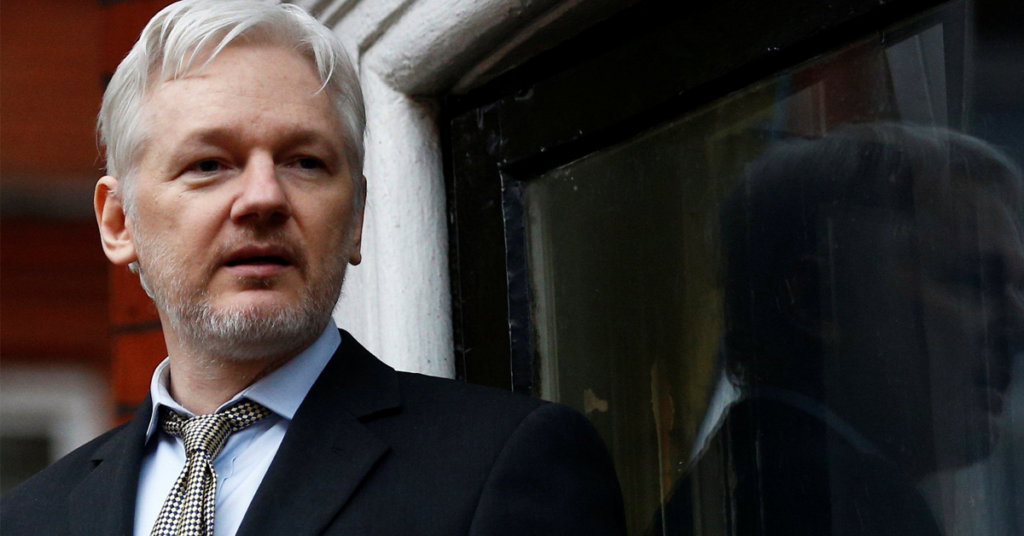
WikiLeaks founder Julian Assange denied Thursday that the Russian government or any other “state parties” were his group’s source for more than 50,000 hacked emails from the files of Hillary Clinton‘s campaign chairman, John Podesta. In separate statements from WikiLeaks and in an interview with a television network supported by the Russian government, Assange dismissed warnings that Russia was the main actor behind cyberintrusions on Podesta and other politically connected individuals and organizations. The WikiLeaks founder offered no evidence to support his denials in the face of U.S. government statements that American intelligence agencies have concluded that Russia was behind the hacking campaigns of Democratic entities in the U.S. Those breaches have raised alarms of potential intrusions on election day. WikiLeaks’ “sources for the Podesta emails currently being published are not state parties,” Assange said in a statement. He also told the RT network that warnings from Clinton and her campaign that Russia was behind the hacking of Podesta’s Gmail account were “false.” “Hillary Clinton has stated multiple times, falsely, that 17 U.S. intelligence agencies had assessed that Russia was the source of our publications,” Assange told the RT network, also known as Russia Today. “That’s false – we can say that the Russian government is not the source.” Russian officials have also denied any role. “Only Russia’s senior-most officials could have authorized these activities,” Director of National Intelligence James Clapper said in October. Clapper did not specifically name Russian President Vladimir Putin or other Russian officials, but U.S. cybersecurity experts concluded that hacking groups affiliated with Russian government and military intelligence services had roles in the breach of the Democratic National Committee. WikiLeaks began releasing nearly 20,000 emails last July hacked from the DNC’s computer system. Some of the emails disparaged Clinton’s rival, Sen. Bernie Sanders, eventually prompting the resignation of then-DNC chair Debbie Wasserman Schultz. U.S. officials and private computer crime specialists blamed that leak on Russian-linked hackers. Assange was granted asylum by Ecuador and lives in its embassy in London. He fled there in 2012 after Sweden pressed a warrant for his arrest on a sexual assault allegation. Media organizations have reported on each new daily WikiLeaks release of Podesta’s emails in recent weeks. Clinton campaign officials have declined to discuss the emails, questioning whether some of the material might be doctored. Thursday’s release of hacked Podesta emails include: In a March 2015 hacked email, Hillary Clinton told her top foreign policy adviser last year that Prime Minister Benjamin Netanyahu of Israel had created “an opening that should be exploited” after Netanyahu was forced to apologize for making remarks about Israeli Arabs that were condemned as racist. Clinton made the comment to adviser Jake Sullivan, who emailed a link to a New York Times story detailing the controversy in Israel over Netanyahu’s remarks and a fight between him and the Obama administration over remarks promising that no Palestinian state would ever be established on his watch. In a hacked email from September 2015, Clinton communications director Jennifer Palmieri told Podesta that Clinton would have to make herself more available to reporters if Vice President Joe Biden entered the presidential race. “But if Biden gets in – we are going to have to make time for her to do more press,” Palmieri wrote. “He will do a ton of it. It is free and he doesn’t have to travel anywhere to do. So I am thinking about a post-Biden press outreach plan, too.” In a hacked email chain from last February, Clinton’s campaign staff discussed whether to respond on the day the nation learned Supreme Court Justice Antonin Scalia had died. “I am having a hard time imagining what she would say,” Palmieri said. “In a day or two it could be appropriate to talk about SCOTUS stakes, but seems off for tonight.” Republished with permission of the Associated Press.
Hacked emails show Hillary Clinton camp discussed ousting Debbie Wasserman Schultz for Jennifer Granholm
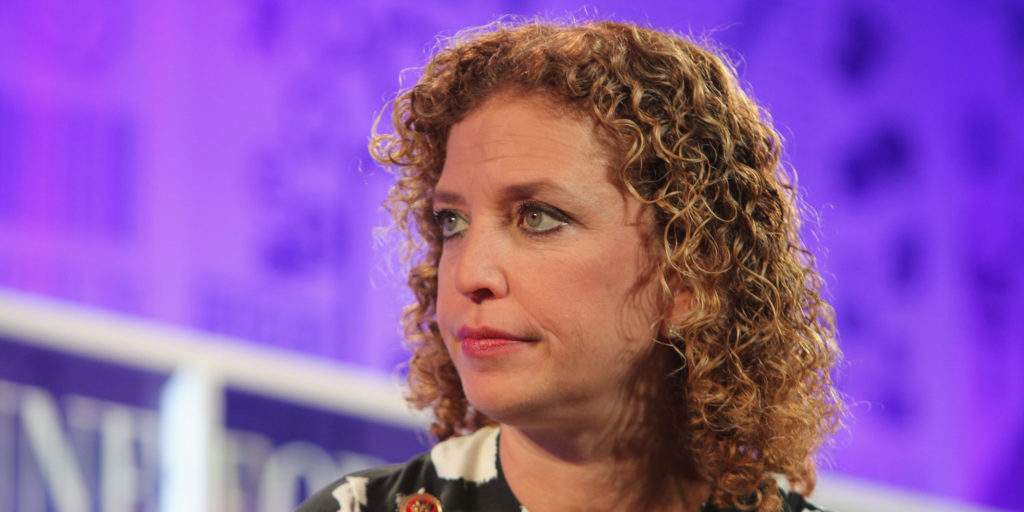
In July, Debbie Wasserman Schultz abruptly resigned as head of the Democratic National Committee, after leaked emails showed party officials conspiring to sabotage the presidential campaign of Vermont Sen. Bernie Sanders. Now, a new email message from the Gmail account of Clinton campaign manager John Podesta — posted by WikiLeaks Tuesday — indicate Hillary Clinton, the candidate campaign officials were considered to be in the tank for, also had serious issues with Wasserman Schultz. Clinton’s staff even discussed ousting her well before her unexpected midsummer exit. On Dec. 17, 2015, Clinton staffer Heather Stone sent out a memo titled “DNC Leadership,” to Podesta, Robby Mook, and Sara Latham. It explained in part the Clinton campaign had encountered challenges in working with Wasserman Schultz, calling for “systemic shifts at the DNC Leadership Level” to facilitate a better working relationship: Though we have reached a working arrangement with them, our dealings with Party leadership have been marked by challenges, often requiring multiple meetings and phone calls to resolve relatively simple matters. We are frequently caught in the middle of poor communication and a difficult relationship between the Chairwoman and the Executive Director. Moreover, leadership at the Committee has been slow to respond to structural challenges within their own operation that could have real impact on our campaign, such as research. Jen O’Malley Dillon has entered into a contract with the DNC as a consultant for the General Election, which addresses some of these challenges and provides a connection for us within the Party. However, this arrangement does not change the need for systemic shifts at the DNC leadership level — to ensure that we have strategic and operational partners within the Committee that can help drive a program and deliver on our General Election imperatives. The memo also said the intention should be to keep Wasserman Schultz as DNC chair up until July’s National Convention. After the convention, however, “we should consider three models for the DNC chairmanship:” Three options discussed would be: — Keep Wasserman Schultz and “work through a chief of staff.” Wasserman Schultz would have been no more than a figurehead in this capacity, the memo states. — Keep Wasserman Schultz in the position, but select someone like former Michigan Gov. Jennifer Granholm as a “General Election Chair.” In that situation, the chief of staff would work with the General Election Chair, while Wasserman Schultz played the role as a chief surrogate. This didn’t seem likely to work, however, as Stone wrote that, “This model has the considerable drawback of creating a two-headed monster with little clarity of who is responsible for different areas of work within the Committee.” — Oust Wasserman Schultz outright for Granholm. “Under this scenario, the convention would represent Congresswoman Wasserman Schultz’s final responsibility to the DNC, and we would use the convention as a clean break between chairs,” wrote Stone. “At the convention, we would honor the Chairwoman’s leadership and service to the Party and introduce the new Chair for the final phase of the campaign.” As it turned out, leaked WikiLeaks emails were released the weekend before the Democratic National Convention in Philadelphia in late July, prompting an outcry among Sanders delegates who always believed Wasserman Schultz was biased for Clinton in her position at the DNC. The uproar was so great, Wasserman Schultz quit the Sunday afternoon before the convention, ultimately replaced by Donna Brazile. Brazile recently left CNN under dubious circumstances following another WikiLeaks release indicating that, while at CNN, she may have passed along a question to Clinton before a debate.
Hillary Clinton and Michelle Obama: First ladies form political odd couple
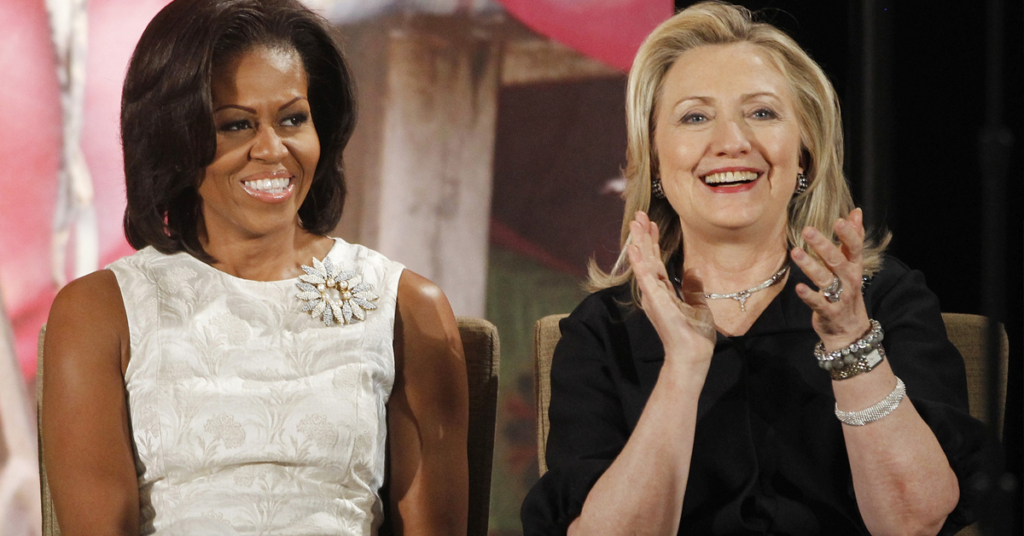
When Hillary Clinton secured her place in the history as the first woman to win a major-party nomination for president, Democratic politicians around Washington marked the historic moment with barrage of statements, formal endorsements and public cheers. One political figure, however, was notably silent: Michelle Obama. The first lady let her husband speak for her during that moment in June, choosing instead to wait weeks to lend her voice to Clinton’s cause at the Democratic National Convention in what would become one of the most memorable moments in the campaign. It was the sort of careful choice that illustrated the gulf of differences between the current and former first ladies, women who have chartered very different paths through public life and are now locked in marriage of mutual interest. When they campaign together for the first time Thursday, the event in Winston-Salem, North Carolina, will bring together one of the least traditional first ladies in modern history with one who has fully embraced tradition. Clinton dove into policy, undertook a massive project and failed under a harsh spotlight. Mrs. Obama largely steered clear and enjoyed quieter, modest success. Both Ivy League-trained lawyers with their own careers, Clinton bridled under the stereotypes associated with the office, Mrs. Obama declared herself “mom-in-chief” (and let it be known she prefers the Mrs. title before her last name). And when her time in the White House was ending, Clinton began plotting her return to Washington. Mrs. Obama hasn’t hid her readiness to leave. Asked if Mrs. Obama would ever consider running for president herself, White House officials who rarely speak for the first lady don’t hesitate. “No,” White House spokesman Josh Earnest said flatly. That’s crushing news to the Democrats who have relished Mrs. Obama’s speeches in support of Clinton as high-points of the campaign cycle. Mrs. Obama’s passionate response to Trump’s vulgar comments about women has brought an emotional resonance to Clinton’s bid that the candidate, who rarely gets personal on the stump, doesn’t often deliver. Mrs. Obama’s appearances have become a key part of Clinton’s effort to fire up women, particularly black women for whom she’s a model and a source of pride. (Clinton even quotes Mrs. Obama’s DNC speech on the stump: “When they go low, we go high.”) Mrs. Obama, meanwhile, has her own reasons for stumping for Clinton and campaigning against Republican Donald Trump. “I think Mrs. Obama really wants to make sure her husband’s legacy is maintained and Mrs. Clinton is the way to get there,” said Myra Gutin, a professor at Rider University who has written about first ladies and women in politics. The partnership has on one level made for a striking political odd couple. As first lady, Mrs. Obama has largely dodged controversial issues. She’s stayed focused on her projects involving healthy eating, exercise, support for military families and education for girls – and not publicly expressed opinions on thornier subjects. She’s mastered the art of advocacy through popular culture, while, in recent years, all-but ignoring the possibility of policymaking through legislation. She’s cultivated a brand built on style, glamour and fashion. It’s a tenure that bears little resemblance to her Democratic predecessor in the East Wing. Clinton came in promising, along with her husband, a new kind of partnership in charge at the White House. Hillary Clinton was a veteran of the feminist movement and ready to expand the office of first lady to suit her experience and passion for policy. She had an office in the West Wing, took over the health care overhaul effort and ultimately became a target of investigations and criticism alongside her husband. It was a history Mrs. Obama and her aides sought to avoid. Asked to cite role models, Obama has named Eleanor Roosevelt and Jacqueline Kennedy. The Clintons and Obamas, of course, have a fraught history, one that includes both spouses. While Barack Obama and Hillary Clinton battled in 2008, Michelle Obama raised questions about her husband’s opponent, framing the choice between the two as “about character.” Since then the women have publicly buried the hatchet. They’ve appeared at countless events together and heaped praised on each other’s work, although there’s little sign they’ve spent time one-on-one. Comparing how first ladies use the office is especially tricky, historians note. Because the office comes with no set of constitutional duties, it is also a reflection of an individual’s style, personality, politics and times. The differences between Clinton and Mrs. Obama’s tenures speak in some ways to the differences in their generations – Clinton representing the first wave of baby boomers eager to push boundaries, while Obama benefited from lessons learned, noted Carl Sferrazza Anthony, a historian at the National First Ladies Library. “Beneath the surface they both brought a sense of rigor and structure and focus,” he said. “They were very objective oriented.” Those objectives were clearly different, he said. “I think Michelle Obama may end up being perhaps one of the most influential first ladies when it comes to influence on the America public, whereas Hillary has been one of the most important in terms of achievement in terms of policy.” Republished with permission of the Associated Press.
Ousted from DNC, Debbie Wasserman Schultz fighting to stay in House

U.S. Rep. Debbie Wasserman Schultz easily won her South Florida district six times, but a Democratic primary challenge from a Bernie Sanders-backed law professor is making her seventh bid less than a sure bet – and her recent resignation as Democratic National Committee chairwoman hasn’t helped. Tim Canova has raised about $2.8 million thanks to the former presidential candidate’s endorsement, an almost unheard of amount for a first-time candidate and almost as much as Wasserman Schultz’s $3 million. He is running an aggressive campaign, accusing Wasserman Schultz of being a pawn of Wall Street who backs corporate donors over progressive causes. The primary is Aug. 30. “Wasserman Schultz is like a lot of politicians who live in their own little bubble. They are not out and around the people and I have been,” said Canova, 56, who teaches business law at Nova Southeastern University. Wasserman Schultz, 49, re-emerged in public Thursday, six days after the Democratic National Convention and her forced resignation as national party chair following a leaked email scandal. She immediately went on the counter-attack, saying Canova is using “disingenuous half-truths, lies and distortions” to attack her record. She received loud applause Thursday night at a forum on healing the rift between the police and black community that was held at a predominantly African-American mega church. “I have a deep and proud commitment to our community,” she said, listing Social Security, the Affordable Care Act and recovery programs that eased the 2008 financial crisis as examples of progressive policies she helped pass. “My opponent can say whatever he wants, but the people I represent … know better.” She also has the support of Vice President Joe Biden, who will campaign on her behalf at a closed fundraiser Friday evening. In Wasserman Schultz’s previous elections, she never drew a primary opponent in her suburban Fort Lauderdale district or a serious Republican challenge. In general elections, she received at least 60 percent of the vote in a 2-to-1 Democratic district that stretches from the ocean to the Everglades and includes high-rise beachfront hotels and condos, golf resorts and luxury malls and a mix of poor, middle-class, retiree and well-heeled communities. Wasserman Schultz has been perceived as such a powerhouse – and the district so uncompetitive – that former U.S. Rep. Allen West, a tough-talking favorite of conservative Republicans and one of her fiercest critics, ran legally in a neighboring district even though he lived in hers to avoid near-certain defeat. The district favored Clinton over Sanders by a 68 to 31 percent margin in the March presidential primary. “I’ve known Debbie for 25 years and she has always been very, very supportive of the district and environmental matters, which is important to me,” said supporter Lily Sayre, who owns a horse stable in Southwest Ranches, a semi-rural enclave in the district. “I’ve always known her to be forthright and standing by what she believes, whether it helps her politically or not.” The email leaks that cost Wasserman Schultz her DNC post are motivating Canova’s backers, who say they prove what they long believed: that Wasserman Schultz threw aside fairness and neutrality to weaken Sanders’ chances of defeating Clinton in the Democratic primaries. “My family fought in the Revolutionary War, the War of 1812, the Civil War and World War I and World War II, including my father. Some of them lost their lives. No one steals my right to a free vote,” said makeup artist Ellen Kinnally, a Sanders supporter who said she moved into the district specifically to vote for Canova. Wasserman Schultz denies showing favoritism in the presidential race, saying she strictly followed party rules. The leaked emails show that DNC staffers closely tracked their boss’s race. They monitored media coverage and tried to get details of a speech Canova gave by internet to an Alaska progressive group while she spoke at that state’s Democratic convention. They circulated a campaign news release about Canova getting Sander’s endorsement – Wasserman Schultz ordered Canova’s name stricken from its headline. Canova said he began considering a challenge last year when he organized opposition to the Trans-Pacific Partnership trade deal and Wasserman Schultz and her congressional staff never agreed to a meeting. She became the only Democrat in Florida’s House delegation who voted to fast-track the pact’s approval, which had been opposed by labor unions, environmental groups and other liberal constituencies as well as some tea party groups on the Republican side. “She has been taking millions of dollars from the biggest Wall Street banks and corporations and I started looking at her voting record and it is lined up with these corporate interests,” he said. Wasserman Schultz said her staff met with Canova and his group in her district office last year and had their concerns heard. “Unfortunately, that’s been what my opponent has engaged in this entire campaign,” she said. The winner of the Wasserman Schultz-Canova race will likely face Republican Joe Kaufman in November. He lost to Wasserman Schultz by a 63 to 37 percent margin in 2014. Republished with permission of the Associated Press.
Her turn now: Hillary Clinton makes her case for presidency
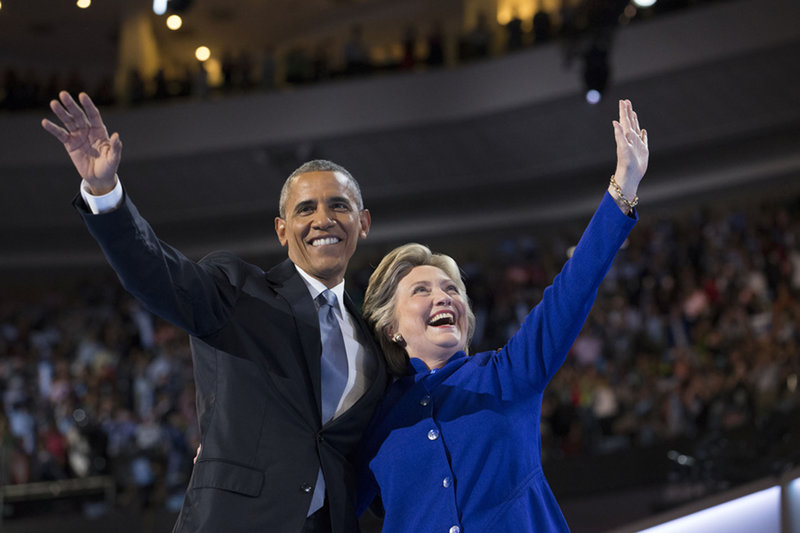
It’s Hillary Clinton‘s turn. After three days of Democratic stars, including a pair of presidents, asserting she is ready for the White House, Clinton must make that case for herself on her nominating convention’s final night. The first woman to lead a major U.S. political party toward the White House, Clinton will be greeted Thursday by a crowd of cheering delegates eager to see history made in the November election. But her real audience will be millions of voters who may welcome her experience but question her character. For Clinton, the stakes are enormous. She’s locked in a tight general election contest with Republican Donald Trump, an unconventional candidate and political novice. Even as Clinton and her validators argue Trump is unqualified for the Oval Office, they recognize the businessman has a visceral connection with some voters in a way the Democratic nominee does not. Campaigning in Iowa Thursday, Trump said there were “a lot of lies being told” at Clinton’s convention. In an earlier statement, he accused Democrats of living in a “fantasy world,” ignoring economic and security troubles as well as Clinton’s controversial email use at the State Department. The FBI’s investigation into Clinton’s use of a private internet server didn’t result in criminal charges, but it did appear to deepen voters’ concerns with her honesty and trustworthiness. A separate pre-convention controversy over hacked Democratic Party emails showing favoritism for Clinton in the primary threatens to deepen the perception that Clinton prefers to play by her own rules. Former Oklahoma Sen. Fred Harris said it was important for his party’s nominee to showcase the “original Hillary Clinton, before she became so guarded” when she takes the convention stage. A parade of speakers at the Philadelphia convention vigorously tried to do just that on Clinton’s behalf. First lady Michelle Obama, former President Bill Clinton and Vice President Joe Biden each cast Clinton as champion for the disadvantaged and a fighter who has withstood decades of Republican attacks. Advocates and other Americans who have met Clinton throughout her career spoke of their quiet moments with one of the world’s most famous women. The Clintons’ daughter, Chelsea, will introduce her Thursday night, painting a personal picture of her mother. The week’s most powerful validation came Wednesday night from President Barack Obama, her victorious primary rival in 2008. Obama declared Clinton not only can defeat Trump’s “deeply pessimistic vision” but also realize the “promise of this great nation.” Seeking to offset possible weariness of a politician who has been in the spotlight for decades, he said of Clinton: “She’s been there for us, even if we haven’t always noticed.” Clinton appeared unannounced on the platform as Obama’s closed his remarks to soak up the midnight roar of cheering Democrats. She pointed at the man who denied her the White House eight years ago, smiled wide and gave him a hug. A studious wonk who prefers policy discussions to soaring oratory, Clinton has acknowledged she struggles with the flourishes that seem to come naturally to Obama and her husband. She’ll lean heavily on her “stronger together” campaign theme, invoking her 1996 book “It Takes a Village,” her campaign said. Indeed, the Democratic convention has been a visual ode those mantras: The first African-American president symbolically seeking to hand the weightiest baton in the free world to a woman. A parade of speakers – gay and straight, young and old, white, black and Hispanic – cast Trump as out-of-touch with a diverse and fast-changing nation. Clinton’s campaign believes there are opportunities to woo moderate Republicans who are unnerved by Trump. That effort was hammered home Wednesday by former New York Mayor Michael Bloomberg, a Republican-turned-independent, who implored Americans to “elect a sane, competent person with sane, international experience.” Ret. Marine General John R. Allen, a former commander in Afghanistan, will underscore the same point. He’s one of several military leaders and service members who have taken the stage to vouch for Clinton’s national security experience. To Democrats, Trump’s comments this week about Russia underscored their concerns about him becoming commander in chief. Following reports Russia hacked Democratic Party emails, Trump said he’d like to see Moscow find the thousands of emails Clinton deleted from the account she used as secretary of state. The appearance of him encouraging Russia to meddle in the presidential campaign enraged Democrats and Republicans, even as he dismissed suggestions from Obama and other Democrats that Moscow already was intervening on his behalf. Hours later, Trump told Fox News he was being “sarcastic” although shortly after his remarks on Wednesday, he tweeted that Russia should share the emails with the FBI. Thursday night’s convention lineup will also showcase Democratic up-and-comers, including Texas Rep. Joaquin Castro; Katie McGinty, a Senate candidate from Pennsylvania, and Illinois Rep. Tammy Duckworth, also a candidate for the Senate. Duckworth, an Iraq war veteran who lost her legs in combat, took on Trump’s readiness to be commander in chief, saying “I didn’t put my life on the line to defend our democracy so you could invite Russia to interfere with it.” Republished with permission of the Associated Press.
Blake Dowling: Consumers can avoid feeling the ‘email Bern’ by hackers

Debbie Wasserman Schultz got to “Feel the Bern” in the form of a hostile crowd of Florida delegates at the Democratic National Committee. Why were these Bern Victims so fired up? The email scandal of course, which led to Schultz’s resignation. The pro-Clinton digital documentation that was revealed in this breach and scandal is a mess. There are several old school rules of thumb that my grandparent’s used to use which were “make sure to get it in writing” and “make sure to not put that in writing.” You should have the same approach to writing emails. “I don’t care if anyone reads this ever.” If it’s not that, delete. Emails can be sent/forwarded to the wrong people, handed over to the courts, watched by the National Security Agency, and for Debbie and the gang at the DNC, hacked. The DNC realized something was wrong going back as far as April. They brought in a professional security firm to analyze their network; they found a breach, blocked it, but it was too late. The bad guys had been inside their world for a year, and they had already taken everything they wanted. It is suspected that a nation state was behind the hack (Russian-backed cybercrime syndicate – Guccifer 2.0 is suspected), and I was asked by the Orlando Sentinel this week how you stop something like that? (See my Q & A with Paul Owens later this week.) The short answer is; you don’t. If you have the resources to build nuclear weapons and fly in space, you can pile up enough code, hackers, hardware and software to perpetuate a successful cyber threat against anyone. Like Bill Clinton and the intern, it’s going to happen eventually. What you need to be thinking about is how to minimize the threat. Your password is your front line of defense. To those of you that have a password that is a variation of the word password or a word that can be found in the dictionary. FAIL. Those rules from information technology experts have been read over and over: use a number, a capital letter, and a symbol in every password gives you some security. There are software programs designed to auto-hack passwords, and by following these protocols, you might just stop a threat in its tracks. The most common attacks are Trojans, Phishing schemes, denial of service (DOS) attacks, Ransomware/Malware (Cryptolocker), and password attacks/brute force attacks. In conjunction with a strong password, put your email somewhere smart. Don’t use a free hosting service for email. There are a dozen examples of free email, but I will minimize my risk of a nasty letter in the mail and not call them by name. You get what you pay for, both in life and email. Use a cloud platform with a “Tier 4” data center. Tier 4 is defined as critical servers and computer systems in a Data Center, with fully redundant subsystems (cooling, power, network links, storage, etc.) and compartmentalized security zones controlled by biometric access control methods. If you have your email on a local server, make sure a state of the art firewall is deployed, and in all cases have up to date hardware with the latest patches, as well as anti-virus and antispam solutions in place. Lastly, if an attack, breach or theft occurs, have a solid backup of your email and data in place. The Russians, Chinese, the 14 people in North Korea with internet access and the wacko next door could all be potential cyber criminals. You can buy kits on the dark web to become a cybercriminal in about seven minutes. So keep thinking defensively, to that end, another way to keep the bad guys out is “two-factor authentication.” This is a method of confirming a user’s identity by utilizing a combination of two different components. These components may be something that the user knows, something that the user possesses or something that is inseparable from the user. An example from everyday life is the withdrawing of money from an ATM. You have to have a bank card (something that the user possesses, 1 factor) and a PIN (personal identification number, 2 factor) allows the transaction to be carried out. The same goes to logging into a commercial site, when they text you a code to enter. Criminals are not getting dumber, but the average American is; see the Pokémon Go craze if you need further evidence. So when it comes to email, keep your eyes wide-open, and security top of mind. Be safe out there. ___ Blake Dowling is chief business development officer at Aegis Business Technologies. His technology columns are published by several organizations. Contact him at dowlingb@aegisbiztech.com or at www.aegisbiztech.com.


